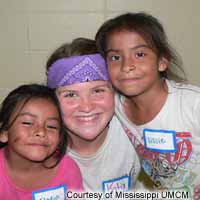Mississippi United Methodist Choctaw Mission

Project Information
Progressing towards health and wholeness and developing Choctaw leadership
Describe the need affecting community
The Tribal Community of the Choctaw people is comprised of 8 Tribal communities with a population of more that 10,000 Tribal members living primary in communities across Mississippi. We serve people living mostly in three of the Tribal Communities in Neshoba and Leake counties. Even with improved changes over the last 15 years many social and cultural challenges remain among the people. There has been marked improvements in the economic development due to good Tribal government leadership and accomplishments. With these improvements, many households continue to be managed by grandparents with several generations living together. High rates of domestic violence, substance abuse, teen pregnancy, low-income, homelessness, suicide and low self-esteem are still concerns in the Tribal communities. The 10,000 population of the Choctaw people is comprised mostly of young people under the age of 25. The high number of young people is attributed to a very high and early (age 50 and less) death rate. The causes of most of the early deaths are related to the high percentage of alcoholism and its related problems and diseases, also, an extreme high rate of diabetes and its effects. We are working with innovative life management skills for children, youth and young adults. Life management skills are one of the problems that young people face in the communities we serve. We look to provide hope, to build self-esteem, capture the truth that all things are possible, to be the best one can be, discover a new way to look at life and to recognize the unlimited potentials waiting to be discovered.
How will this Advance project help to address the need?
We realize the needs in the Tribal communities are numerous and complex. We also realize that the impact of Tribal culture is an important aspect that we will be aware of. We know we must listen to the people and respect their culture. We are listening and discerning how we can be a good source for the conditions and needs the Tribal Communities encounter. As we move forward, we are working with programs to address life management skills for children, youth and young adults. These programs consist of personal development, building relationships, healthy daily living, good nutritional practices, career and employment, how to manage money and time, and how to look at life in a new way. Because of this program, we will not only have an impact on the children, youth and young adults but the community as a whole to include the family structure. The overall expected outcome is for the young people to learn and acquire the necessary skills and knowledge to prepare them for a successful productive self-sufficient life and be fruitful effective people in their Tribal culture and society with an awareness of self-understanding. The curriculum include self-discovery of who am I, and relationship building, on how to be effective communicators, critical thinking, honor traditional and cultural preservation. Time and money management, healthy daily living, good healthy nutrition. How to provide good healthcare, employment and career opportunities, and also how to give to the community through service projects.
Describe the primary goal of the project
The goal of this project is to help develop a foundation for young people that will guide them step by step to effectively emerge as whole confident individuals through a learning growth process. The long term impact is that the young people participating in this program will be prepared for a successful productive self-sufficient life and be effective in society with a spiritual and self-understanding.
Describe the change you would like to see in the community as a result of this Advance project
The young people completing the training will learn and acquire the necessary skills and knowledge to bridge the gap in their abilities to be successful in the community and to overcome the struggles and challenges of life as they transition to through life to adulthood.

